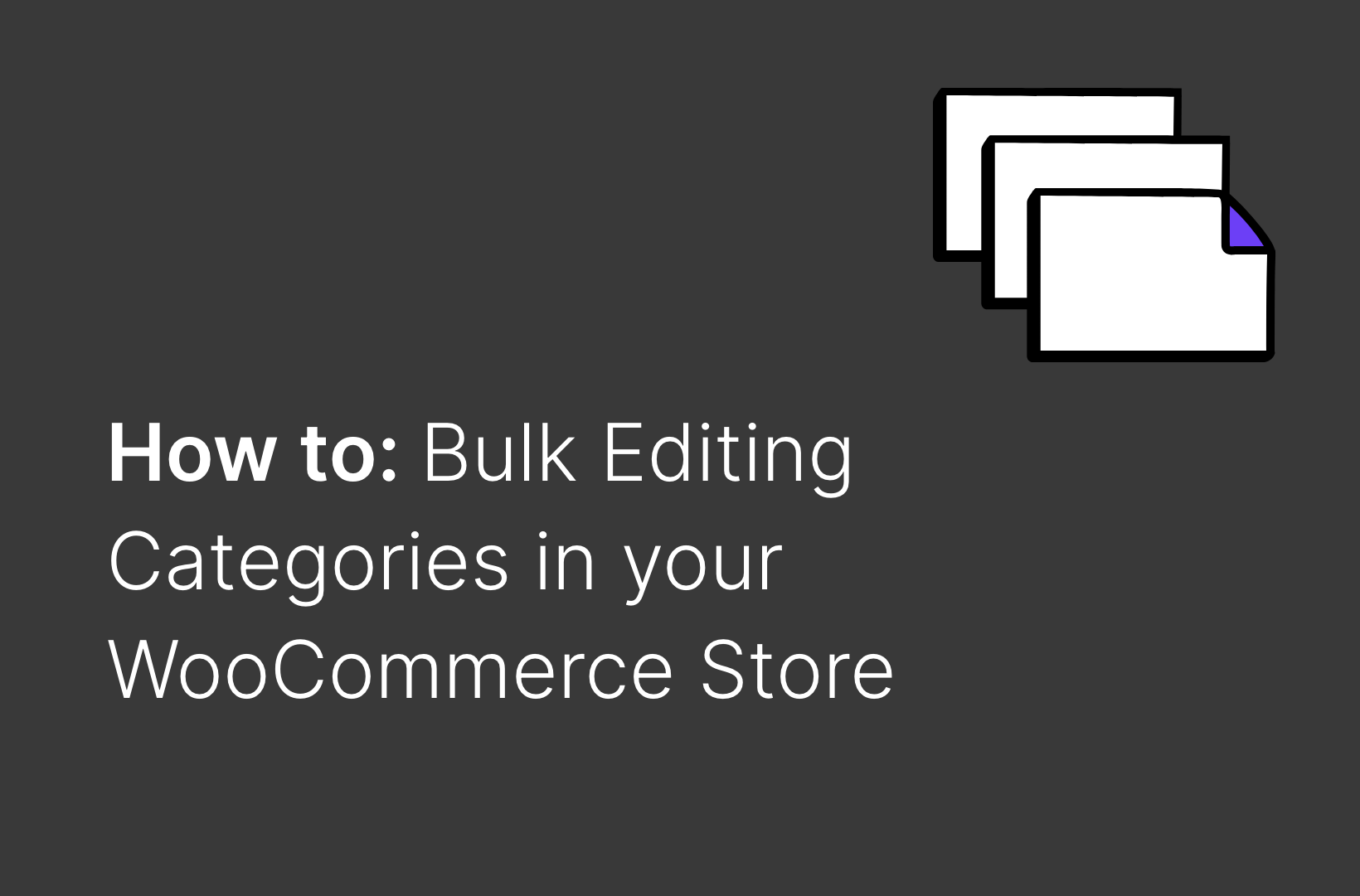A Detailed Review and Rating of DDoS Mitigation Solutions
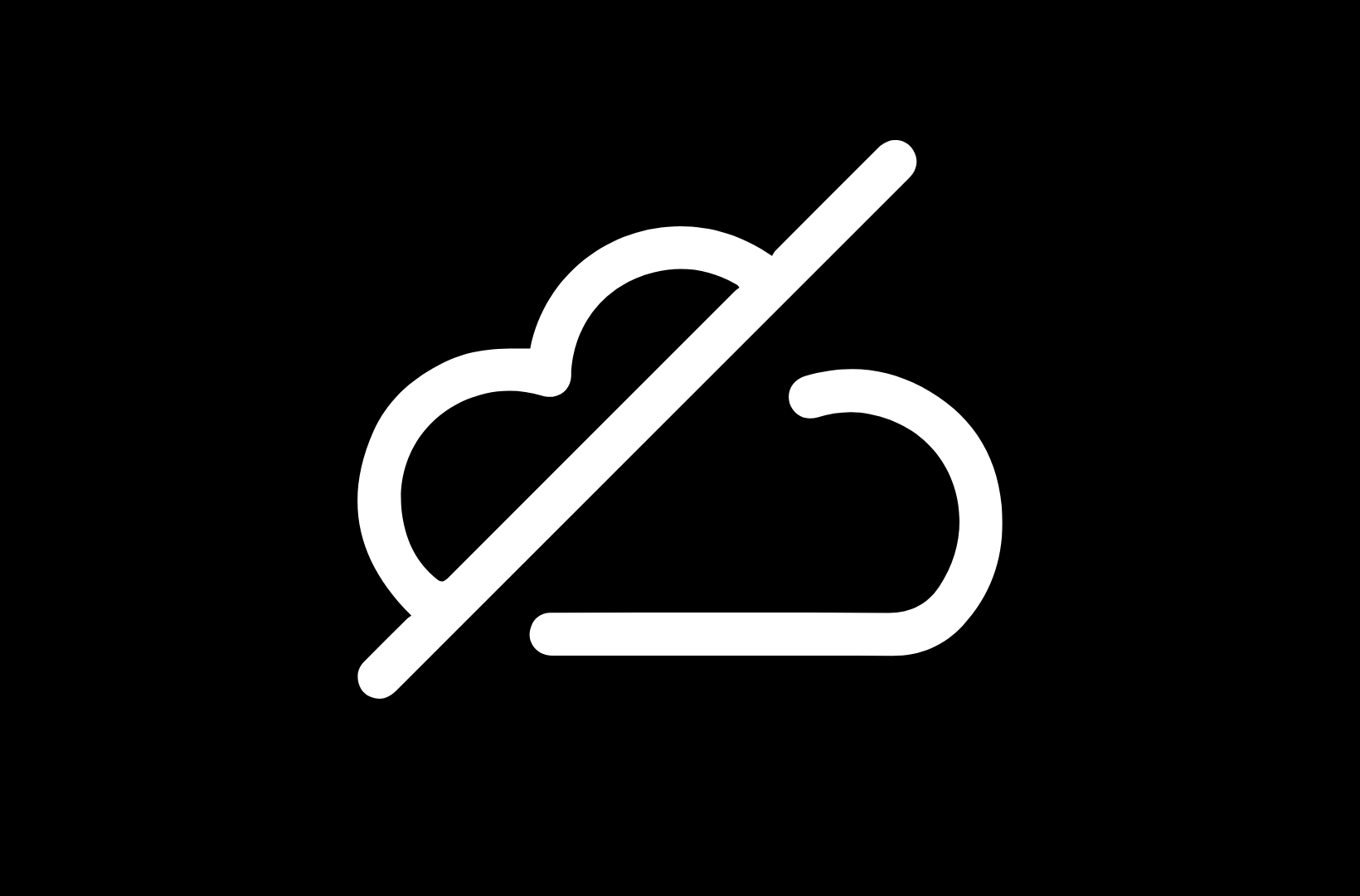
One of the most significant threats to service availability and data security is Distributed Denial of Service (DDoS) attacks. A DDoS attack floods a website’s server with immense volumes of fake traffic, rendering it unresponsive. Such attacks can disrupt service provision, negatively impact customer experience, potentially diminish brand reputation, and lead to significant revenue loss.
This is where DDoS mitigation comes into play. DDoS mitigation solutions work by identifying and sifting out the malicious, illegitimate surges associated with DDoS attack traffic, ensuring the smooth passage of genuine user traffic.
These security services can be implemented in many different ways, depending on your business requirements and budgets. They can be installed through specialized hardware appliances, on-network protection facilitated by Internet Service Providers (ISPs), or by subscribing to cloud-based DDoS protection services.
In this article, we’ll run through a comparative analysis of leading DDoS mitigation solutions, including free, open-source, and enterprise-level alternatives.
Types of DDoS mitigation services
Website DDoS protection
Website DDoS protection services protect websites against the onslaughts of DDoS attacks. They absorb and disperse attacks, preventing any potential disruption to site services.
What sets Website DDoS Protection apart is that it allows real users to continue their online activities while effectively filtering out harmful, bot-generated traffic.
Application DDoS protection
As the name suggests, application DDoS protection specifically targets attacks at the application layer. As these attacks seek to exploit the vulnerabilities within web applications, this particular layer of protection is extremely important.
By keeping application-layer attacks at bay, you can improve the reliability and integrity of the software that your website is dependent on.
Network DDoS protection
Network DDoS protection works on securing the underlying network infrastructure that makes up a website. Its role is fundamental in maintaining the security of your online store’s supporting network against the incursion of DDoS attacks.
This type of protection makes sure that your online services’ operations are still functional, even when a DDoS attack attempts to pierce through your network defenses. It works by rate limiting and IP reputation lists, adding yet another layer of defense to your network, thereby making it a formidable barrier against DDoS attacks.
Criteria for selecting vigorous DDoS mitigation solutions
There are many available services, so we’ve gathered the most important qualities of DDoS mitigation solutions so you know what to look for.
Ensure your provider offers scalable solutions that match your network’s size and growth trajectory. The ability to swiftly scale protections during an attack is pivotal, as it ensures uninterrupted service delivery even under immense traffic surges.
Kostas Seresiotis, Senior Product Engineer at Saucal
- Mitigation capacity: To keep your services uninterrupted in the face of a sudden influx of harmful traffic, your DDoS mitigation must be equipped to handle high-volume traffic. Pay close attention to their bandwidth scope, data transfer limits, and abilities to adapt in real-time to traffic surges. Senior Product Engineer Kostas Seresiotis notes “Ensure your provider offers scalable solutions that match your network’s size and growth trajectory. The ability to swiftly scale protections during an attack is pivotal, as it ensures uninterrupted service delivery even under immense traffic surges.“
- Processing capacity: The DDoS mitigation service you choose should possess effective processing power to manage high loads and keep the site performance unscathed, even under a DDoS attack.
- Latency: Latency refers to delays in data communication over a network, for example, slow loading of web pages, which increase dramatically during a DDoS attack. That’s why you should look for a DDoS mitigation solution with mechanisms in place to manage latency and prioritize legitimate traffic.
- Time to mitigation: This determines how quickly a mitigation service can respond when a DDoS attack is detected. This period is crucial due to the fact that the duration of the attack could have serious implications – longer attacks can disrupt services and potentially lead to more loss. Therefore, a shorter mitigation time is generally better, as it means the solution can swiftly kick into action, limit the damage caused by the attack, and minimize downtime.
- Protection of secondary assets: Modern DDoS attacks not only target the primary domain, but also include assaults on secondary assets like sub-domains and APIs. Your DDoS mitigation solution should provide a comprehensive protection strategy that extends to all digital assets linked to your primary domain.
- Protection of individual IPs: Some DDoS attacks might take a more tactical approach and target individual IPs associated with your business. In such a scenario, not just your main domain but every linked asset could be at risk. Therefore, the DDoS mitigation service should have capabilities to protect individual IPs from targeted attacks.
Comparative analysis of top-tier DDoS mitigation services
Cloudflare

First and foremost is Cloudflare, a widely recognized name in the cybersecurity industry, known for its advanced solutions that offer robust protection against DDoS attacks.
Here are some of the benefits you get with them:
- Cloudflare protects websites against DDoS attacks by leveraging Anycast – its global network. This effective strategy allows it to absorb and dissipate the malicious traffic related to a DDoS attack, ensuring that your website continues to perform optimally for its legitimate users, undeterred by any ongoing attack.
- It also has exceptional capabilities to shield against unusually large attacks that exceed 1 Tbps, instantly scaling its protective measures as needed – ensuring your website’s unchanged availability.
- The service includes an advanced content delivery network (CDN), which improves site performance while enhancing security. Detailed analytics, real-time monitoring, and round-the-clock professional support are other significant aspects of it.
- As part of our WooCommerce managed services, Saucal has integrated Cloudflare’s Enterprise DDoS Mitigation. This not only provides substantial DDoS protection but also enhances other aspects of the ecommerce experience.
With its all-around efficient performance in safeguarding your ecommerce endeavors against cyber attacks, we confidently recommend Cloudflare as the best DDoS solution, especially for those who wish to ensure uninterrupted business operations and a network security service they can count on.
Azure

Azure is part of Microsoft‘s product line, providing businesses with a vital line of defense against potential DDoS threats.
Here is what you need to know about this service:
- Azure’s DDoS Protection Standard acts like a vigilant security guard, keeping an eye on the crowd and ensuring that only legitimate traffic gets access while stopping malicious traffic right at the entry. This intelligent, real-time scrutiny of traffic from Azure is enabled through advanced machine learning algorithms.
- Azure’s DDoS Protection Standard integrates with other Azure services. For example, using Azure’s Security Center along with DDoS Protection, users can manage their overall security picture from a single place. The result is a streamlined security model where data from DDoS Protection contributes to a broader understanding of an organization’s security.
- Pricing is based solely on the resources utilized. Businesses enjoy predictable expenses without compromising the quality of protection.
Radware
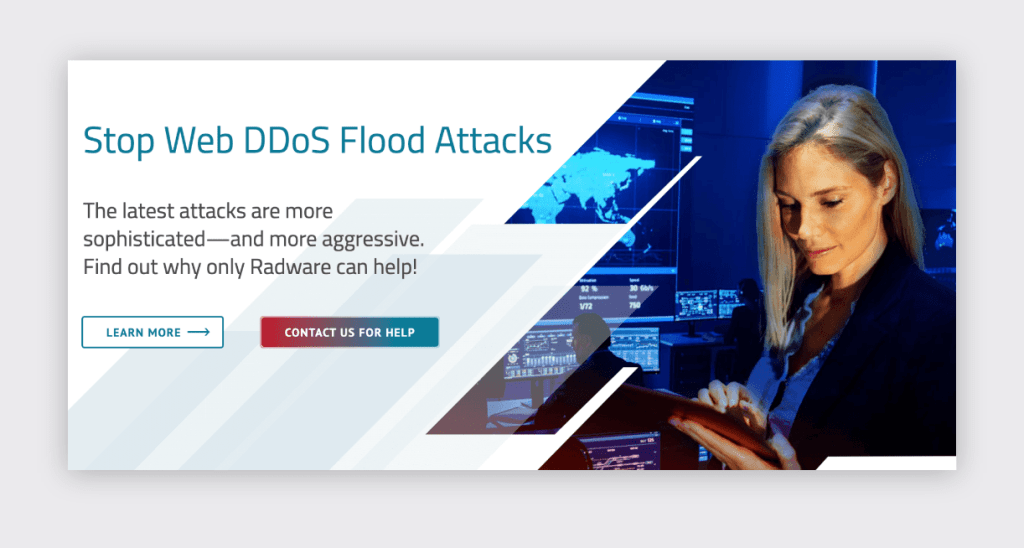
Radware is one of the key players in the cybersecurity domain, delivering strong application and cybersecurity solutions to businesses.
Radware’s DefensePro uses Network Behavior Analysis (NBA), heuristic recognition algorithms, and signature-based detection to offer a multi-layered protection scheme capable of warding off known, unknown, and evolving threats. This protection mechanism ensures the security of your network even in the face of zero-day attacks.
Key features of this service include:
- Behavioral-based detection that is aware of the normal traffic patterns and can distinguish an actual attack from legitimate surges, thereby minimizing false alarms while maintaining service availability.
- Its capability to create real-time signatures for identified threats – a proactive approach to mitigation that can strengthen businesses against advancing DDoS threats.
- Quick response time to attacks, allowing businesses to continue functioning even during an attack.
- Special Key Performance Indicators (KPIs), such as reduced false positives, minimized system latency, and consistent uptime, helping organizations estimate the value of the service.
AWS Shield
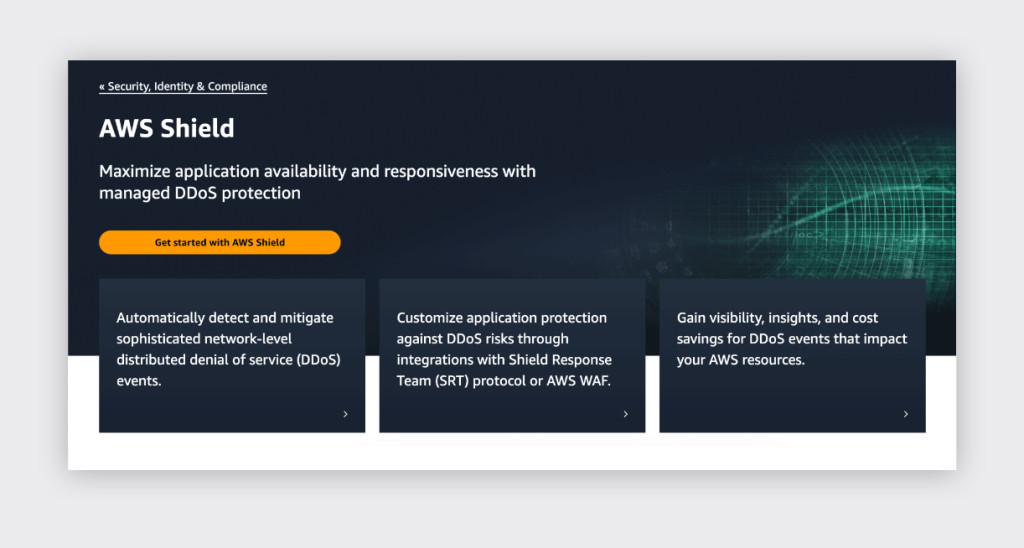
Standing firm against the waves of cyber threats is Amazon Web Services’ managed DDoS protection service, AWS Shield.
There are two tiers to the service:
- AWS Shield Standard, which is included with all AWS services at no extra cost. It offers automatic defense against the most frequent DDoS attacks, such as SYN/ACK floods, reflection attacks, and HTTP slow reads, thereby promoting application availability.
- AWS Shield Advanced is a premium subscription-based service formulated for sophisticated DDoS protection. It includes advanced threat protection, cost safeguards against DDoS-related charges, 24/7 access to a DDoS response team (DRT), AWS firewall manager, and risk management reports.
Both tiers offer integration with other AWS services such as Route 53, Cloudfront, and Elastic Load Balancing. This pairing creates a firm layer of defense against DDoS attacks, delivering a holistic and reliable protection strategy for AWS users.
Akamai Prolexic Routed
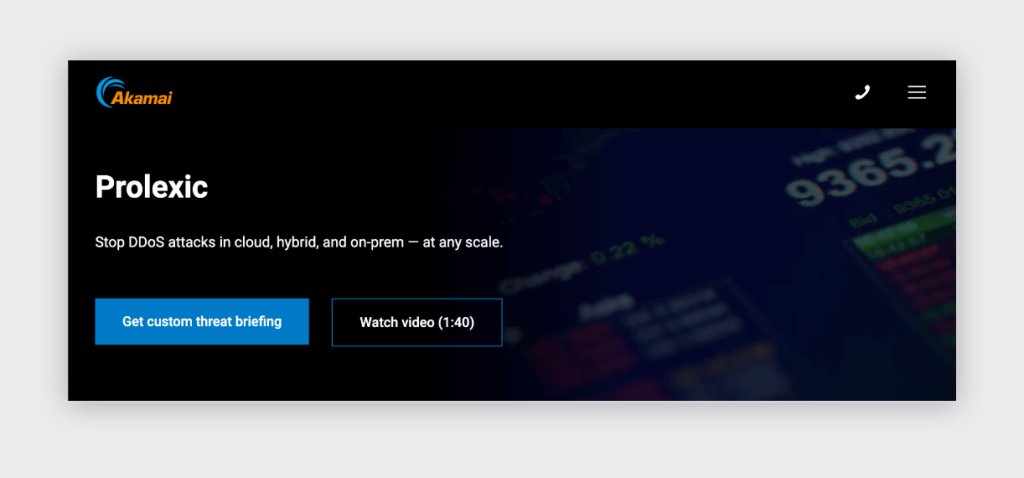
Finally, we have Akamai Technologies’ solution Prolexic Routed.
Key features include:
- A proactive mitigation service that safeguards your IP applications against large-scale, high-intensity DDoS attacks, thus preventing the interruption of your online resources.
- Intelligent traffic rerouting. Prolexic Routed ensures fluid, automatic traffic diversion by changing DNS mappings and redirecting malicious traffic to Akamai’s globally dispersed scrubbing centers. This “cleaning” facility filters out the disruption, allowing only harmless traffic to approach your site.
- A pledge to a Time To Mitigate (TTM) service level agreement (SLA) of under 10 minutes.
Get Cloudflare Enterprise DDoS Mitigation with Saucal’s Managed WooCommerce
As technology evolves, so do DDoS threats. With these attacks becoming more frequent and complex, WooCommerce store owners find themselves in the line of fire, battling risks that could create significant service disruption and potential damage to their data and reputation.
Saucal is a results-driven WooCommerce agency that has been consistently delivering solid security solutions to businesses. With a reputation for managing WooCommerce services, taking care of everything from secure hosting, worry-free uptime, and advanced threat detection to content delivery designed to deliver exceptional user experience.
We’ve worked with numerous clients, helping them navigate through spikes in traffic, maintain their site’s uptime, and safeguard their businesses against DDoS threats. This is achieved thanks to our strong partnership with Cloudflare Enterprise, a market leader in DDoS mitigation.
We are also able to solve issues caused by automated anti-DDoS systems that often feature in more complex eCommerce sites with third-party integrations, which block legitimate requests. We work on a case-by-case basis to get around issues like this.
If you’re eager to fortify your WooCommerce store and enhance its performance, we recommend you book a DDoS resilience consultation – a vital step towards understanding your needs and building a solution tailored to your business.


